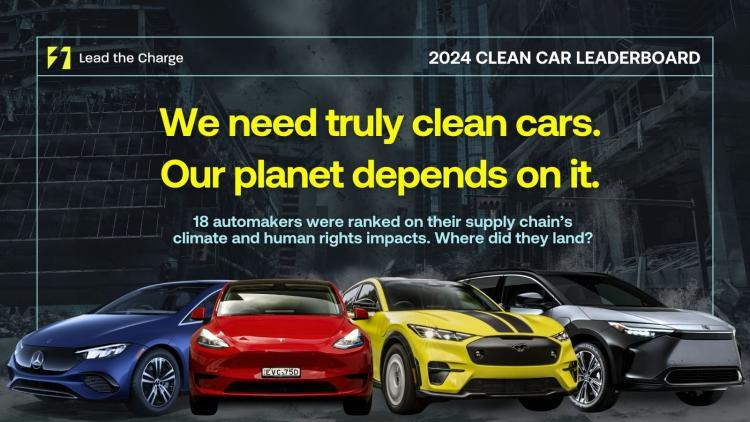Lead the Charge Report: Automakers 'Abysmal' on Indigenous Rights Risk Due Diligence, Indigenous Peoples' Rights Must be Prioritized throughout EV Supply Chains

This article was originally published by the Securing Indigenous Peoples' Rights in the Green Economy (SIRGE) Coalition.
Lack of Indigenous Rights Risk due diligence is still pervasive in the automotive industry, reports the second edition of the Lead the Charge Leaderboard, which assessed 18 of the world’s leading automakers to evaluate their efforts “to eliminate emissions, environmental harms, and human rights violations from their supply chains.”
According to the report, automakers are ignoring risks and potential harm to Indigenous Peoples in their supply chains and are failing to take action to scope for Indigenous Rights Risk and uphold the rights of Indigenous Peoples. The inability to scope for Indigenous Peoples’ rights is “clearly an issue that must be prioritized by the auto industry moving forward.”
Despite some industry improvements on human rights due diligence since Lead the Charge first published the leaderboard in 2023, Indigenous Peoples’ rights are still the lowest-scoring among 80 indicators, and where the industry has shown the least amount of improvement:
For the second year in a row, company progress remained abysmal in the Indigenous rights subsection: the average score was just 4%, an increase of 1 percentage point over the year. This means that this subsection continues to receive the lowest average score of all, but was also the issue where automakers made the least progress…
With 11 out of the 18 automakers continuing to score 0% on Indigenous Peoples’ rights and with 70% of automakers making no progress on Indigenous Peoples’ rights, the report demonstrates lack of adequate action by the industry to ensure a just transition across supply chains.
“It is imperative to recognize that any missteps in this transition could potentially inflict harm upon Indigenous Peoples, affecting their livelihoods, cultural connections to ancestral lands, and the biodiversity they have responsibly stewarded for centuries,” said Galina Angarova, Executive Director of Securing Indigenous Peoples' Rights in the Green Economy (SIRGE) Coalition upon launch of the leaderboard. "Recognition, respect, and upholding of Indigenous Peoples' right to self-determination, operationalized through the full implementation of Free, Prior and Informed Consent (FPIC), stands as the cornerstone for a truly just and equitable energy transition benefiting all.”
FPIC AS THE CORNERSTONE TO CLEAN CAR SUPPLY CHAIN RISK DUE DILIGENCE
As demand for electric vehicles increases and with more than half of the minerals used in renewable energy technology located on or near Indigenous Peoples’ lands, activities across the auto supply chain must respect Indigenous Peoples’ right to self-determination and to FPIC.
Too often extraction projects linked to auto supply chains are conducted on Indigenous Peoples’ territories without FPIC and sometimes displacing them from ancestral lands, said the report. These projects pollute communities’ life-sustaining resources and violate Indigenous Peoples’ right to food, water, livelihoods, and culture.
“Upholding the principles of FPIC ensures that Indigenous communities actively participate in the decision-making processes that directly affect their lives and territories, and fosters a transition that respects their autonomy and well-being,” said Angarova.
The Leaderboard evaluated automakers’ FPIC due diligence on projects and activities on Indigenous Peoples’ lands and territories. The five highest ranking companies on were Tesla (26%), Mercedes (15%), GM (11%), BMW (8%), and Ford (7%).
Tesla was notable for its improved score, which rose from 5% to 26%. This occurred after an update to their FPIC requirement in their human rights policy, stating that: "For all raw material extraction and processing used in Tesla's products, we expect our suppliers to engage with legitimate representatives of indigenous communities and respect their right to grant or withhold free, prior, and informed consent for their operations." In addition, the automaker provided case studies on its assessment of Indigenous rights involving lithium development in Chile and Argentina and nickel development in Canada and Indonesia.
Mercedes requires suppliers to comply with FPIC in its Responsible Sourcing Standards, but does not reference the United Nations Declaration on the Rights of Indigenous Peoples (UNDRIP), which articulates minimum standards to uphold Indigenous Peoples’ rights. The company also identifies impacts to “community and indigenous rights” as a supply chain risk but does not specify FPIC.
BMW, Mercedes and General Motors (GM) were the only companies that made explicit commitments to the UNDRIP. GM made this commitment in both its overall human rights policy and its Supplier Code of Conduct, but has come under criticism for failing to respect FPIC via its investment in Lithium Americas’ Thacker Pass mine (see the SIRGE Coalition case study below). While Tesla, Mercedes, GM and BMW were the only automakers with explicit commitments to respect FPIC, none disclosed whether the commitments were translated into the languages of Indigenous Peoples impacted from their supply chains – a prerequisite for FPIC to be achieved.
Automakers must develop comprehensive processes to solicit and respect Indigenous Peoples' FPIC and transform their supply chains to ensure the rights of Indigenous Peoples, and all rights holders, are respected. Companies that have made some progress in human rights and Indigenous Rights Risk due diligence can leverage momentum to expressly identify and prevent violations of Indigenous Peoples’ rights in their supply chains. The energy transition and the transition to clean cars is an opportunity to change industry norms and provide a pathway for a more just and sustainable future for all.

